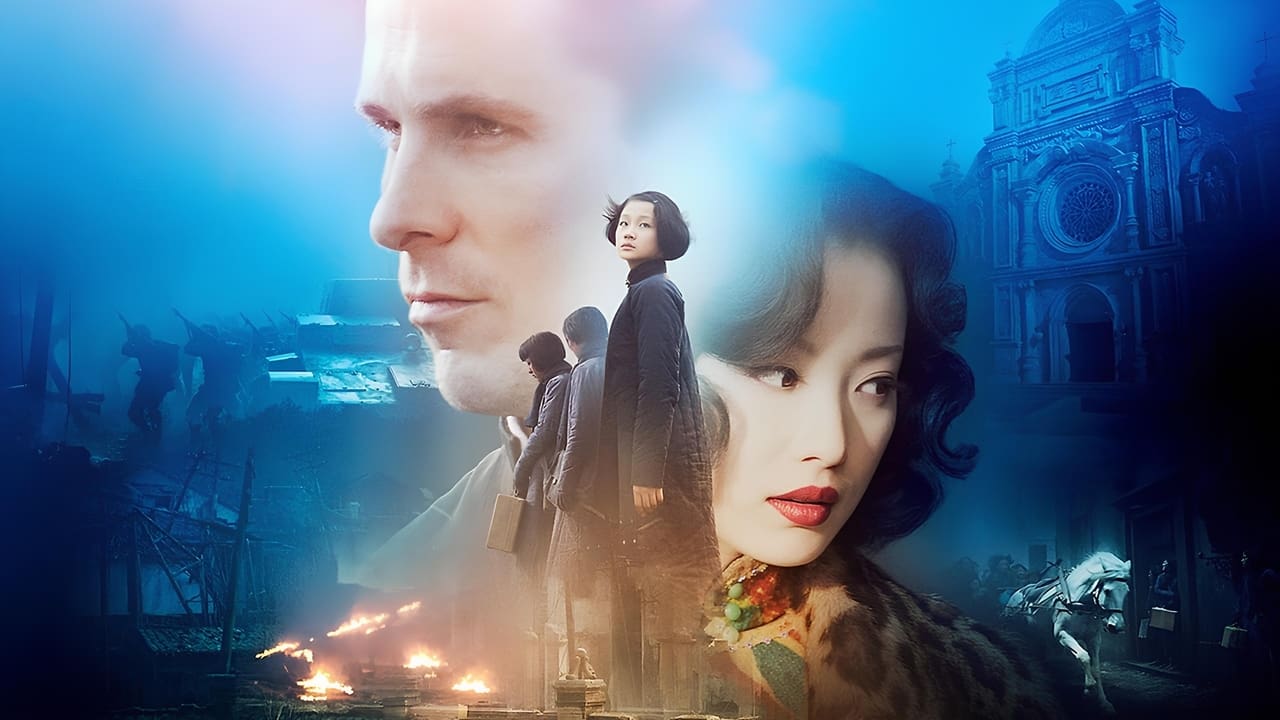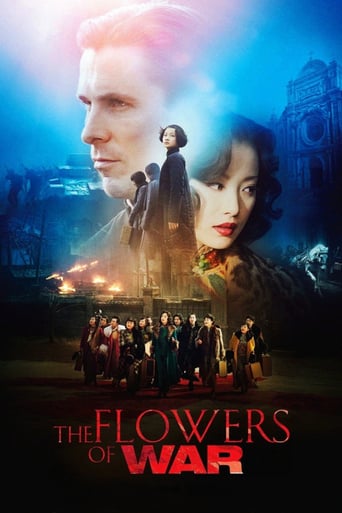

Best movie ever!
... View MoreWhat a freaking movie. So many twists and turns. Absolutely intense from start to finish.
... View MoreAt first rather annoying in its heavy emphasis on reenactments, this movie ultimately proves fascinating, simply because the complicated, highly dramatic tale it tells still almost defies belief.
... View MoreA great movie, one of the best of this year. There was a bit of confusion at one point in the plot, but nothing serious.
... View MoreHistory or inspired by events can be more than imagination or art. This is one such story, in the telling; ask .."Why War?!" Ever! Never! The English word for this film is two-edged: Tragedy / Redemption / Pathos ... and * brilliance * Are they three(?), of course -- Because it is just ONE thing. They "label" you apply, is such and such of your own experience.A friend of mine, discovered around the time she was the same age as these school girls in this film, that her mother needed to escape China; and had been Forced to leave two half-sisters that my friend never, ever knew.I believe my friend learned this from an aunt or cousin but never found the right time to broach the subject with her mother (now passed-on).No one says things -- BUT -- This experience is Too Common by far(!); I've heard tell from Polish, Norweigens, and even Germans & Italians (yes! Even!), Chinese, Korean, Malays, Philipines ... A HUMAN Story.Today we have Daesh!"When will we ever learn" ~ Peter, Paul and Mary
... View MoreDirector Zhang YiMou, has delivered a powerful film in Flowers of War that touches on very prominent themes in Chinese culture. Zhang is able to weave an intricate web of characters with contradicting intentions, who ultimately change these intentions to serve a far better cause. The directing talent of one of China's most well regarded directors is on full display, as he balances themes of redemption, self-sacrificing, and the flawed hero. The aforementioned themes on the surface are typical universal themes in literature and film, however as the plot unfolds, they take on a specifically Chinese distinction, and remind us all of the beautifully intimate complexity of Chinese society and culture. In the beginning of the film we see the unlikely mingling, of Chinese prostitutes and catholic school girls. The film represents the prostitutes as typical stereotypes of that profession. Scantily clad women, who are loud, obnoxious, rude, and self-serving. Their demeanor and appearance contrast the young Catholic school girls in every way imaginable. These two sides come to resent each other rather quickly as they are forced to share in the sanctuary of the church in the midst of Japanese occupation. Even Mo, the de-facto leader of the prostitutes wants to use her skills as a prostitute to convince John, to get her and her friends, not the school girls, out of Nanking. However, this selfishness theme and resentment that the two groups have for one another will be turned on its head later in the film. Another universal theme that takes on a Chinese characteristic is that of the flawed hero. John on the surface seems to portray this theme perfectly. At the beginning of the film he is a drunkard who is solely interested in money and the services of the prostitutes he conveniently meets in a church of all places. However towards the end of the film he becomes the hero as he courageously protects the girls from harm, and ultimately leads them to safety. Yet his transformation pales in comparison to that of the prostitutes. The prostitutes will contradict the typical stereotypes of self-serving prostitutes to that of martyr like heroines. Chinese literature has a unique and intriguing fascination with blooming flowers and fruit. The title of the film Flowers of War also explores the connection between flowers and some heavy handed themes. What did Zhang want to represent with the flowers? This can be one of two things. The flowers could represent the sexual exploitation of women by Japanese soldiers. Hence flowers of war could represent spoils of war for the Japanese soldiers. However, the blooming of the flower could symbolize the ultimate sacrifice the women make in order to save the girls. A flower blooms at the apex of its beauty. This beauty shows through the women at the moment of their ultimate sacrifice. Shortly after the flower blooms the petals fall off and die, we also assume that the women die, shortly after the beauty in their character "blooms". However the dying petals make way for blooming of new fruit. This represents the renewed chance of life for the catholic school girls. Their lives are saved literally and figuratively. Literally from the murderous Japanese soldiers, and figuratively from the soul crushing cruelty of rape. So what's the point of this film? What is director Zhang trying to tell us? In order to answer this question, we need to go back and examine that idea of beautifully intimate complexity. Unfortunately in Asian countries, and particularly in China, the plight of women in oppressive male centric societies, is an all too common reality. From the casual adherence to forced prostitution, to the lifelong crippling anguish of foot binding. To say Chinese women have suffered, is a dramatic understatement. Yet there is an odd silver lining to all this suffering that this film and Chinese literature in general has shown. Chinese women show amazing capacity of self-sacrifice. Chinese literature is full of stories about women who give up so much, so that others may benefit. Whether it's a daughter who gouges out her own eyes so that her father can be cured, or it's a woman spy condemning herself to die so that her lover may live, Chinese woman consistently make these sacrifices. Whether it's because of their devalued sense of worth, or because years of oppression has strengthen their sense of empathy, we will never know for sure. But this is the wonderfully complicated beauty of Chines culture, which something so righteous can come from something so cruel. Towards the end of the Movie, Mo reveals that she was once like the school girls, and she states that, "her story is just another misfortune", just another child forced into prostitution, and there is no way she will let that happen to the school girls. Under no circumstances will she allow them to suffer the same fate as her. Jon also echoes this sentiment about the prostitutes when he states that, "They (the prostitutes) love and hate like all of us and perhaps they know more about suffering than any of us". Perhaps they do, but not just the prostitutes, all Chinese women know what it is to suffer, and through centuries of oppression, Chinese women have become the quintessential symbols of self-sacrificing women so that others may survive. In conclusion, I must say that this has become one of my favorite films. It teaches us not to judge too quickly someone that society has deemed to be of a lower stature. The women in this film has contradicted that notion that prostitutes are incapable of altruism and that they should be seen as lowly individuals. The fact is, they like any group that has been so cruelly oppressed for so long, are capable of extraordinary sacrifices. Within the backdrop of a vicious war, the inner beauty of these women's souls has fully bloomed into a beautiful flower.
... View MoreI really like watching this movie. The story had a very good plot and most actors have a very good performance. Chrisitan Bale is a fantastic actor and could show one of his acts in this movie. Moreover, the story can take you to the end of the movie. I think this movie could teach us lessons about humanity and how the war can cause damages and destroy people. It also could show us that everybody, even though, with peccadilloes in life, can change to a hero if they wants. I like the way John decide to stay in the church and the way that people in church accept each other and showed unity, which seems unlikely but can happen in hardship. Good movie!
... View MoreIn 1937, Nanking stands at the forefront of a war between China and Japan. As the invading Japanese Imperial Army overruns China's capital city, desperate civilians seek refuge behind the nominally protective walls of a western cathedral. Here, John Miller (Christian Bale), an American trapped amidst the chaos of battle and the ensuing occupation takes shelter, joined by a group of innocent schoolgirls and thirteen courtesans, equally determined to escape the horrors taking place outside the church walls. Struggling to survive the violence and persecution wrought by the Japanese army, it is an act of heroism which eventually leads the seemingly disparate group to fight back, risking their lives for the sake of everyone.
... View More